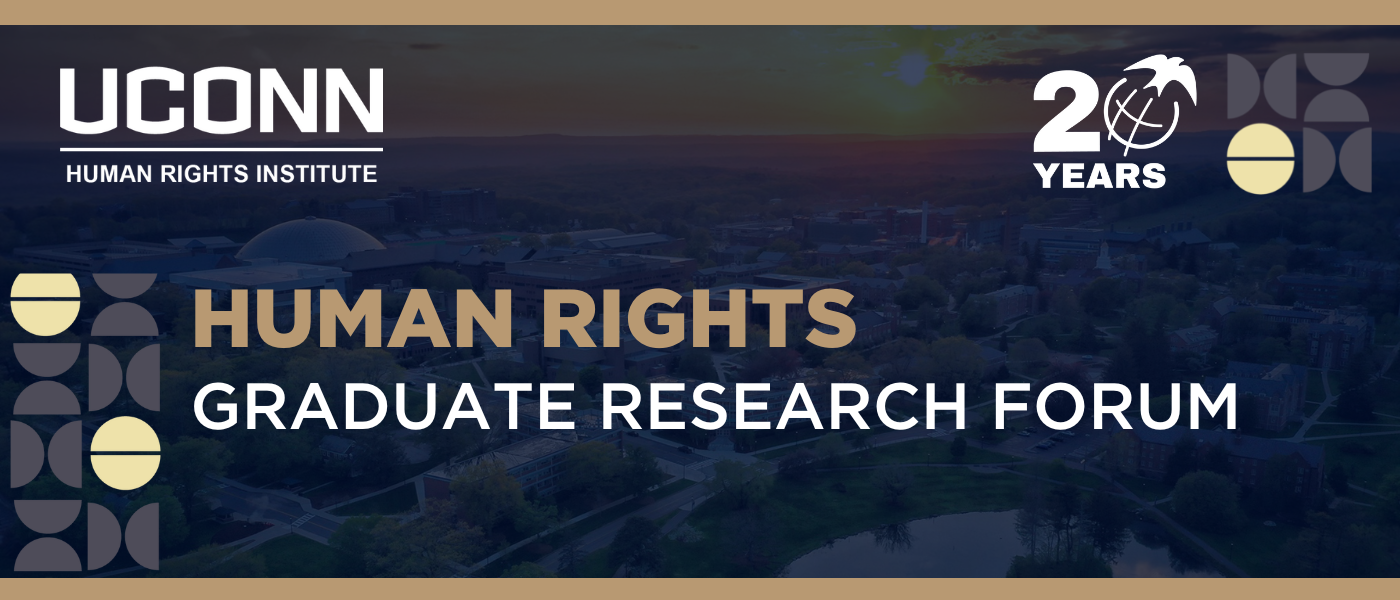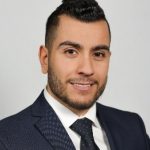February 8, March 8, & April 12, 2023
The Dodd Center for Human Rights Lounge

About the Forum:
The Human Rights Graduate Research Forum provides an opportunity for graduate students in any discipline or school doing human rights-related work to receive feedback from peers and faculty in an informal and supportive environment. These forums occur once per month during the academic year. Each session is split between the student researcher's presentation and time reserved for questions and feedback.
We welcome graduate students and faculty from any discipline or school to attend. UConn graduate students doing human rights-related work are encouraged to sign up to discuss their work in a future forum.
Join us!
This series will be hosted in-person, no registration is necessary.
All sessions will take place in the lounge of The Dodd Center for Human Rights.
Sessions
Global Labor Rights Enforcement in Small and Medium-Sized Textile Firms
Wednesday, February 8, 2023 | 2:00 pm - 3:30 pm
Imge Akaslan
SMEs, enterprises that have 10 to 250 employees, account for two-thirds of all jobs worldwide, yet this significant segment of the global supply chain is heavily under-researched in contemporary scholarship on labor rights and policy approaches to labor rights protection often overlook their unique challenges. Through the in-depth study of SMEs in the Turkish textile industry, this project both advances our understanding of how small enterprises function, and also identifies new actors which influence variation in the enforcement of labor rights standards. Omitting SMEs as an entity leads to underestimation of some subset of actors’ role on enforcement of labor rights. Therefore, one of the main goals of this dissertation is to understand how intermediary actors influence the translation of labor rights norms into labor rights standards. By understanding the incentives of possible translators, we can then shape those incentives to influence the behavior of those translators and potentially improve labor standards in global supply chains. Ultimately, my findings will inform policy dialogues and advocacy efforts aimed at enhancing the human dignity of workers in global supply chains, no matter the size of the firm in which they work.
About Imge Akaslan
 Imge Akaslan is a PhD candidate at the University of Connecticut, Political Science Department. Her dissertation research examines the variation in the enforcement of labor standards in small and medium-sized enterprises and identifies new actors which influence the enforcement of labor standards in global supply chains. Imge holds a BS in global and international affairs from Middle East Technical University (Turkey) and an MA in political science from Binghamton University (SUNY).
Imge Akaslan is a PhD candidate at the University of Connecticut, Political Science Department. Her dissertation research examines the variation in the enforcement of labor standards in small and medium-sized enterprises and identifies new actors which influence the enforcement of labor standards in global supply chains. Imge holds a BS in global and international affairs from Middle East Technical University (Turkey) and an MA in political science from Binghamton University (SUNY).
The Electric Vehicle Revolution: From a Human Rights Angle
Wednesday, March 8, 2023 | 2:00 pm - 3:30 pm
Francesco Rouhana
Electric vehicles (EVs) have evolved rapidly owing to technological advancements and a growing interest in renewable energy to eliminate transportation’s dependency on fossil fuels and mitigate the effects of climate change. While EVs could revolutionize the transportation industry, they could jeopardize social equity and environmental stewardship efforts. Current studies on transportation electrification often fail to evaluate the EV revolution implications in human rights terms. International human rights law provides universally accepted norms, standards, baseline indicators, and modes of inquiry and reporting that could significantly advance and sharpen impact analysis. In this study, we explored the potential human rights implications that EVs pose for individuals and societies throughout their life cycle. Using the Universal Declaration of Human Rights and other human rights-based treaties as our baseline, we analyzed the existing and likely EVs’ impacts on human rights. We identified potential measures to address human rights violations. Stakeholders (governments, private sectors, civil society) need to work closely together to make the transition to low-carbon transportation more equitable and sustainable.
About Francesco Rouhana
 Francesco Rouhana is a Ph.D. student in the Civil and Environmental Engineering Department at the University of Connecticut. He holds a bachelor’s degree in Civil Engineering and a master’s degree in Civil Engineering with a concentration in Transportation and Urban Planning from Notre Dame University – Louaize, Beirut, Lebanon. His research interests include the resilience of civil infrastructure systems, disaster risk reduction, response, and recovery.
Francesco Rouhana is a Ph.D. student in the Civil and Environmental Engineering Department at the University of Connecticut. He holds a bachelor’s degree in Civil Engineering and a master’s degree in Civil Engineering with a concentration in Transportation and Urban Planning from Notre Dame University – Louaize, Beirut, Lebanon. His research interests include the resilience of civil infrastructure systems, disaster risk reduction, response, and recovery.
Exclusion and Embrace: Secondary Refugee Students and A Pedagogy of Belonging
Wednesday, April 12, 2023 | 3:00 pm - 4:30 pm
Sara Harvel
About Sara Harvel
 Sara Harvel is a doctoral candidate in the School of Education. Her focus is on Curriculum and Instruction with an emphasis on social studies education and human rights. She taught internationally in Qingdao, China for several years and also did NGO work on the Thai-Myanmar border, focusing on child advocacy and social entrepreneurship. Sara is a graduate assistant with the Neag School of Education and with Dodd Impact. She is interested in human rights education, refugee and immigrant school experiences, teacher education, and school communities.
Sara Harvel is a doctoral candidate in the School of Education. Her focus is on Curriculum and Instruction with an emphasis on social studies education and human rights. She taught internationally in Qingdao, China for several years and also did NGO work on the Thai-Myanmar border, focusing on child advocacy and social entrepreneurship. Sara is a graduate assistant with the Neag School of Education and with Dodd Impact. She is interested in human rights education, refugee and immigrant school experiences, teacher education, and school communities.